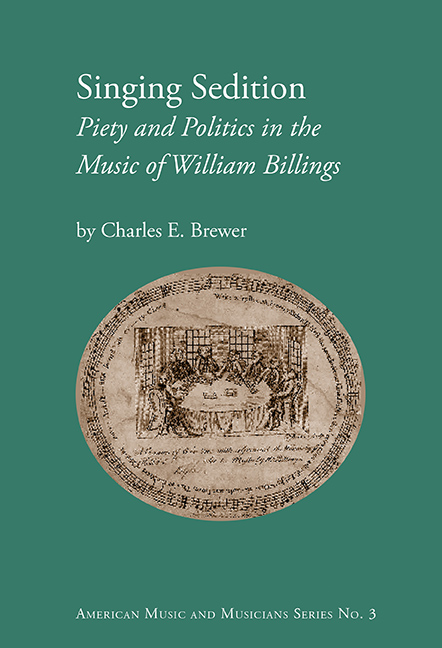Book contents
- Frontmatter
- Table of Contents
- List of Illustrations, Musical Examples, and Tables
- Prologue
- Acknowledgements
- Abbreviations
- Part I Rebellious Voices in Billings's Boston
- Chapter One Samuel Adams, Singing Societies, and Boston Orations
- Chapter Two The Clerical “Black Regiment”
- Part II Singing the Rebellion
- Epilogue
- Appendices
- Bibliography
- Index
Chapter One - Samuel Adams, Singing Societies, and Boston Orations
from Part I - Rebellious Voices in Billings's Boston
- Frontmatter
- Table of Contents
- List of Illustrations, Musical Examples, and Tables
- Prologue
- Acknowledgements
- Abbreviations
- Part I Rebellious Voices in Billings's Boston
- Chapter One Samuel Adams, Singing Societies, and Boston Orations
- Chapter Two The Clerical “Black Regiment”
- Part II Singing the Rebellion
- Epilogue
- Appendices
- Bibliography
- Index
Summary
INTRODUCTION
On Sunday, 28 September 1800, Rev. William Bentley (1759-1819) noted the passing of William Billings in his diary.
William Billings, æt. 60, died also at Boston. This self taught man thirty years ago had the direction of all the music of our Churches. His Reuben, as he whimsically called it, with all its great imperfections, had great fame and he may justly be considered as the father of our New England music. Many who have imitated him have excelled him, but none of them had better original powers. His late attempts & without a proper education were the true cause of his inferior excellence. He taught the singers at the Brattle Street church in 1778 with great approbation & his fame was great in the Churches. He was a singular man, of moderate size, short of one leg, with one eye, without any address, & with an uncommon negligence of person. Still he spake & sung & thought as a man above the common abilities. He died poor & neglected & perhaps did too much to neglect himself.
Billings's “Reuben” was his The New-England Psalm-Singer, first published in 1770, the first collection of original compositions published in British North America. In the preface to The Singing-Master's Assistant (1778), Billings reflected back to the joy he felt when he received the first copies of his first book, however imperfect, and wrote that “Thou art my Reuben, my first born, the beginning of my strength, the excellency of my dignity, and the excellency of my power.” This publication was evidently the origin of Rev. Bentley's exaggerated statement that at that time Billings “had the direction of all the music of our Churches.”
Certainly, Billings lack of a “proper education” was commented upon by many later writers, especially those more associated with the church-music reform movements of the nineteenth century who echoed Bentley's assessment of Billings's “inferior excellence.” Lowell Mason, an acknowledged leader of the reform movement wrote this appraisal of Billings in the preface to his The National Psalmist.
The author, if we may judge by his books, was quite ignorant of the principles of harmony and composition; indeed he professes to be governed by no laws but those of his own fancy, and he rejects all those rules to which good taste and experience had led the best composers, and in the observance of which they had been successful.
- Type
- Chapter
- Information
- Singing SeditionPiety and Politics in the Music of William Billings, pp. 3 - 28Publisher: Boydell & BrewerPrint publication year: 2017

